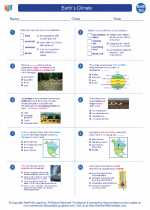Continuity in Earth Science
Continuity in Earth Science refers to the concept that processes and materials on Earth operate in a continuous and interconnected manner. This concept helps us understand the interactions and relationships between different Earth systems and how they influence each other. It plays a crucial role in studying phenomena such as climate change, geological processes, and the behavior of Earth's natural resources.
Key Concepts
1. Earth Systems: Continuity helps us understand how the atmosphere, hydrosphere, geosphere, and biosphere interact and influence each other.
2. Geological Processes: It explains the interconnected nature of processes like erosion, sedimentation, and tectonic movements.
3. Climate Change: Continuity aids in analyzing the complex relationships between factors such as greenhouse gas emissions, ocean currents, and atmospheric conditions.
4. Natural Resource Management: It is vital in understanding the sustainable use of resources like water, minerals, and energy sources.
Study Guide
- Define continuity in the context of Earth Science.
- Discuss the interconnected nature of Earth's systems and how continuity plays a role in their interactions.
- Explain the concept of continuity in relation to geological processes such as weathering, erosion, and deposition.
- Explore the impact of continuity on climate change and how various Earth systems contribute to this phenomenon.
- Analyze the importance of continuity in the sustainable management of natural resources.
Understanding continuity in Earth Science is essential for comprehending the complex and dynamic nature of our planet and the interactions that shape its environment. It provides a framework for investigating and addressing various environmental issues and phenomena.
[Continuity] Related Worksheets and Study Guides:
.◂Earth Science Worksheets and Study Guides High School. Earth`s Climate

 Worksheet/Answer key
Worksheet/Answer key
 Worksheet/Answer key
Worksheet/Answer key
 Vocabulary/Answer key
Vocabulary/Answer key
 Vocabulary/Answer key
Vocabulary/Answer key
 Vocabulary/Answer key
Vocabulary/Answer key
